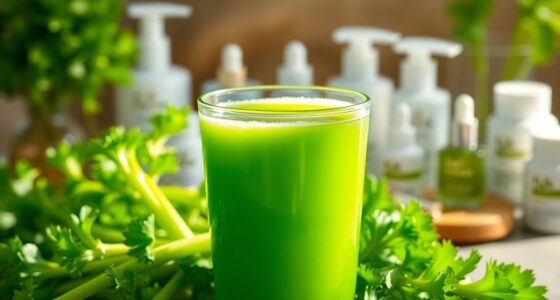Aloe vera juice may seem like a health wonder, but it's not without its downsides. It can cause gastrointestinal issues like diarrhea, cramping, and abdominal pain. You might also experience skin irritation or allergic reactions, especially if you're sensitive to certain plants. Additionally, it can considerably lower blood sugar levels, interact with medications, and pose risks for pregnant women and children. There are important long-term health risks to reflect upon, so stay informed about what you consume.
Key Takeaways
- Aloe vera juice can cause gastrointestinal issues, including diarrhea and abdominal pain, especially when consumed in large quantities.
- Skin irritation and allergic reactions may occur from topical use, particularly in those sensitive to Liliaceae family plants.
- Aloe vera juice may significantly lower blood sugar levels, posing risks of hypoglycemia when combined with diabetes medications.
- Consuming aloe latex is linked to certain cancers, leading to its ban by the FDA due to safety concerns.
- Pregnant women and children under 12 should avoid aloe vera products due to potential health risks and adverse effects.
Potential Gastrointestinal Issues
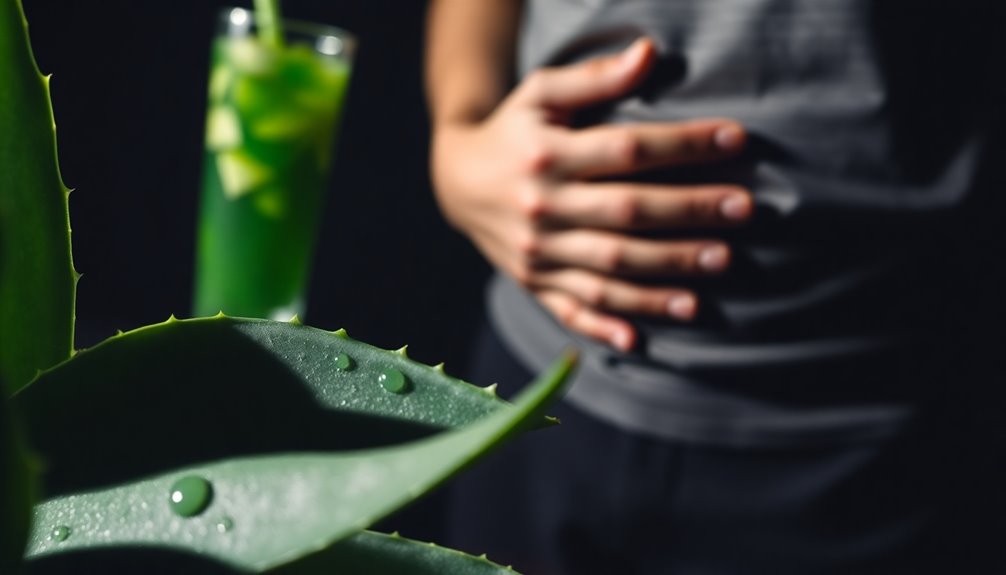
While aloe vera juice can offer several health benefits, it’s important to be aware of its potential gastrointestinal issues. Some individuals may experience digestive discomfort, such as cramps or diarrhea, particularly when consuming it in large quantities. Therefore, it’s advisable to start with small amounts and observe how your body reacts. In addition to its digestive properties, aloe vera is also celebrated for its numerous aloe vera benefits for hair, as it can promote scalp health and add shine to your locks. Moreover, aloe vera is packed with vitamins and minerals that nourish hair follicles, which can lead to healthier hair growth. The hydrating properties of this succulent also help in preventing dryness and flakiness, making it an excellent natural remedy for scalp issues. With these notable aloe vera hair benefits, it’s clear why this plant has become a popular choice in various hair care products.
The juice's natural laxative properties might cause diarrhea, especially if you consume it in large amounts. This can lead to gastrointestinal problems, including cramping and abdominal pain.
If you have irritable bowel syndrome or a sensitive digestive system, you should be particularly cautious, as aloe vera can exacerbate your symptoms.
Additionally, excessive consumption may lower potassium levels, risking an electrolyte imbalance that could affect your heart function.
Severe cases of aloe vera latex overdose can lead to dehydration and significant discomfort.
Always monitor your intake to avoid these unpleasant side effects.
Skin Irritation and Allergic Reactions
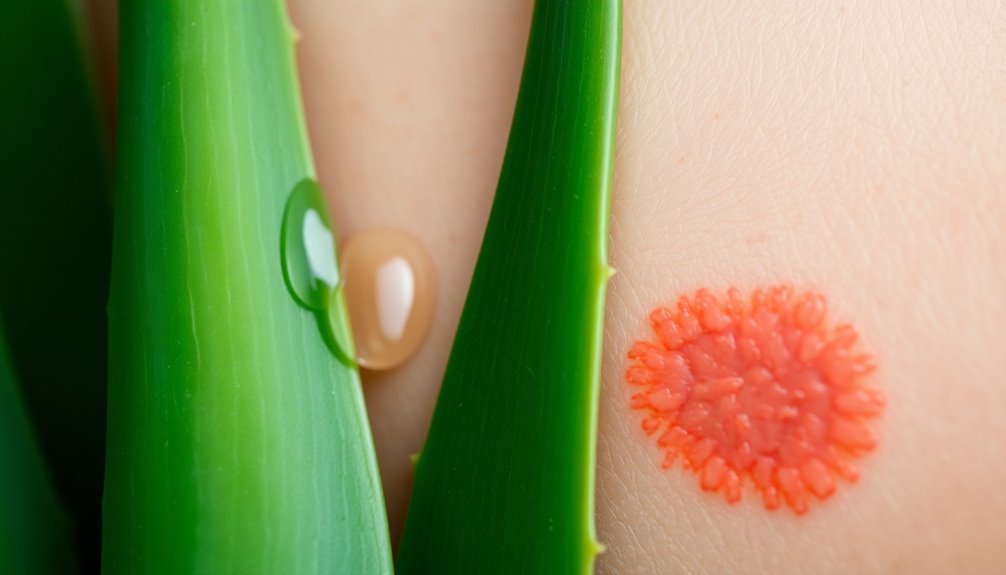
When you apply aloe vera gel to your skin, you might experience irritation like redness, itching, or a burning sensation.
If you're sensitive to plants in the Liliaceae family, you could face allergic reactions, including rashes or swelling.
It's essential to monitor your skin's response and conduct patch tests to guarantee you're not allergic before using it widely.
Common Skin Reactions
Aloe vera is often praised for its soothing properties, but it can cause skin reactions in some people. When used topically, you might experience skin irritation, including redness, itching, or burning sensations.
If you have sensitivities to plants in the Liliaceae family, consider patch testing before applying aloe vera to your skin. Prolonged use can exacerbate these issues, leading to rashes or increased sun sensitivity.
In sensitive individuals, allergic reactions may present as hives or even respiratory problems like chest pain. If you notice severe reactions, it's vital to seek medical attention immediately, as symptoms can escalate quickly. Additionally, always ensure to perform a patch test before applying aloe vera to check for any adverse effects.
Always listen to your skin and stop using aloe vera if you experience any adverse effects.
Allergy Symptoms Overview
Skin irritation from topical aloe vera can sometimes signal underlying allergic reactions. If you notice symptoms like skin rashes or hives after applying aloe vera, it's crucial to take them seriously.
Individuals sensitive to plants in the Liliaceae family may experience itching or a burning sensation. Patch tests can help determine if you're likely to have an allergic reaction.
In some cases, severe allergic reactions can occur, leading to difficulty breathing, swelling, or chest pain. If you experience these symptoms, seek immediate medical attention.
It's wise to consult a healthcare professional before using aloe vera products, especially if you have a history of allergies, to minimize the risk of adverse reactions. Additionally, being aware of narcissistic behaviors can help you understand how emotional factors may influence your health decisions.
Stay safe and informed!
Impact on Blood Sugar Levels
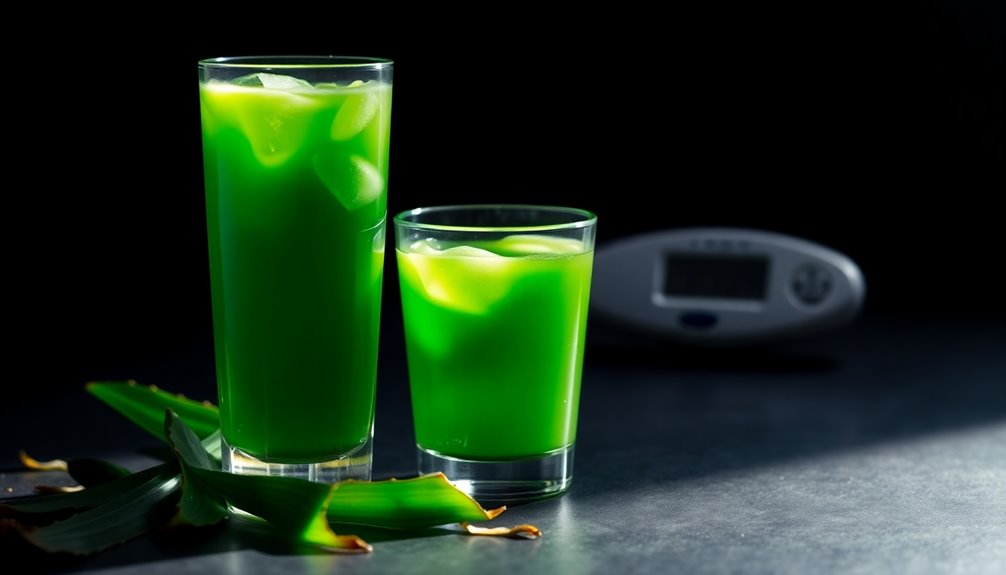
While managing blood sugar levels, you might find that aloe vera juice can significantly lower those levels, offering potential benefits for individuals with type 2 diabetes.
However, be cautious—high doses of aloe latex can lead to kidney damage and increase health risks. If you're using diabetes medications or insulin, combining these with aloe vera could result in hypoglycemia, making it essential to monitor blood sugar closely.
Prolonged consumption may also cause constipation, especially for those already on diabetes meds. To navigate these concerns effectively, consult your healthcare provider.
They can help you understand the right dosage and guarantee your blood sugar levels remain balanced, avoiding any potential imbalances that could arise from aloe vera juice consumption.
Interactions With Medications
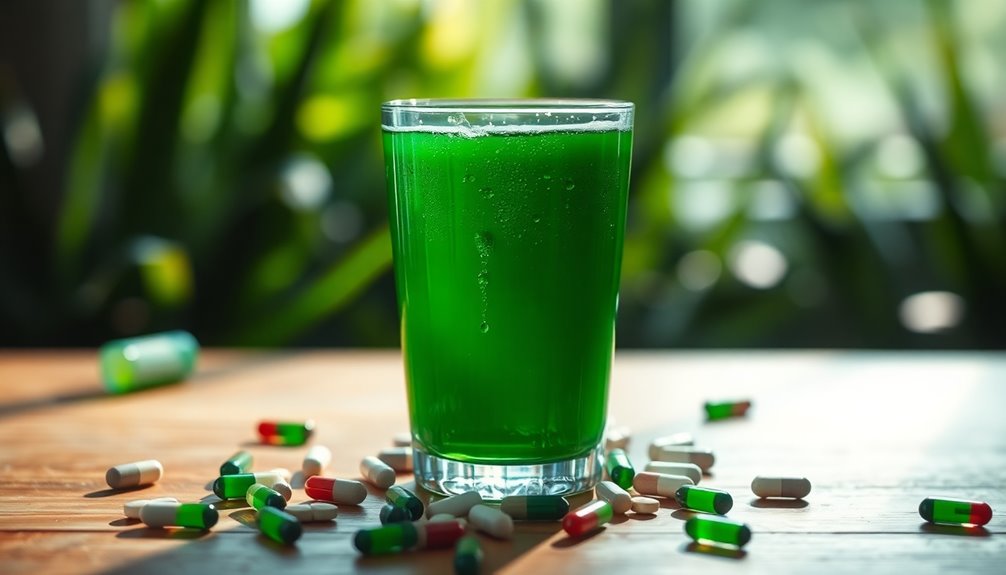
When you take aloe vera juice, its strong laxative effects can interfere with the absorption of certain medications.
This means that if you're on diabetes medications, you might need to watch your blood sugar levels closely, as the combination could lead to hypoglycemia.
Always consult your doctor before mixing aloe vera with any prescription drugs to avoid unwanted interactions.
Laxative Effects on Absorption
Aloe vera latex can significantly impact the absorption of oral medications due to its strong laxative effects.
Its laxative properties increase gastrointestinal motility, which can reduce medication absorption time in your digestive tract. If you're taking diabetes medications, be cautious; aloe vera can lower blood sugar levels and may lead to hypoglycemia when combined with insulin.
Additionally, aloe latex might interact with anticoagulant medications like warfarin, heightening the risk of bleeding by affecting their absorption and metabolism.
Co-using aloe latex with stimulant laxatives can cause excessive diarrhea, dehydration, and dangerous drops in potassium levels, complicating your medication interactions even further.
Always consult your healthcare provider before combining these substances.
Blood Sugar Interaction Risk
The strong laxative effects of aloe vera can complicate blood sugar management, especially for those taking diabetes medications.
Aloe vera juice can notably lower blood sugar levels, increasing the risk of hypoglycemia when combined with insulin or sulfonylureas. You'll need to monitor your blood sugar levels closely to avoid dangerously low readings.
Prolonged use of aloe vera juice may also lead to constipation, further complicating diabetes management.
If you're on digoxin, be cautious—aloe latex can reduce potassium levels, heightening side effects.
Always consult your healthcare provider before adding aloe vera juice to your routine to guarantee safe management of your condition and to discuss any potential interactions with your diabetes medications.
Safety Concerns for Specific Populations
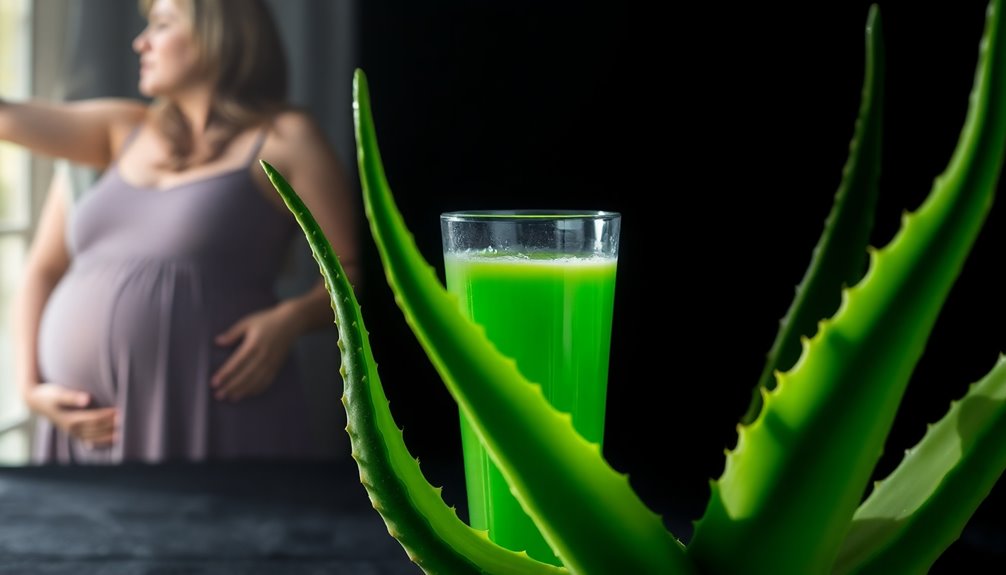
While many people enjoy the benefits of aloe vera juice, certain populations should be particularly cautious. Pregnant women should avoid it due to its strong laxative effects, which pose safety concerns linked to miscarriage. Children under 12 shouldn't consume aloe latex, as it can cause adverse effects like abdominal cramps. If you have gastrointestinal conditions, such as Crohn's disease, aloe latex can irritate and worsen symptoms. Those with kidney problems must be careful, as high doses can lead to acute kidney failure. Additionally, individuals allergic to plants in the Liliaceae family may experience severe allergic reactions.
| Population | Safety Concern |
|---|---|
| Pregnant Women | Risk of miscarriage |
| Children | Abdominal cramps, diarrhea |
| Gastrointestinal | GI irritation |
| Kidney Problems | Acute kidney failure |
| Allergic Reactions | Skin rashes, difficulty breathing |
Long-Term Health Risks
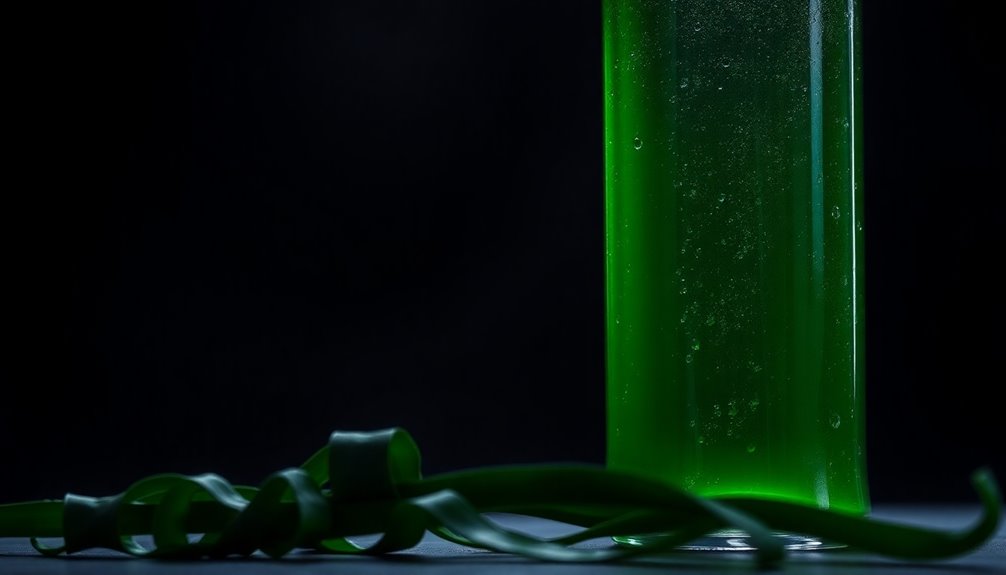
Although many people turn to aloe vera juice for its health benefits, long-term use can pose significant risks to your well-being. Here are some serious health risks you should know:
- Kidney failure: Aloe latex can cause acute kidney issues due to its potent laxative effects.
- Low potassium: Prolonged consumption may lead to electrolyte imbalances, causing muscle weakness and irregular heartbeats.
- Gastrointestinal issues: You might experience chronic diarrhea and stomach cramps, leading to dehydration.
- Cancer risk: Long-term use of unprocessed aloe latex has been linked to certain cancers.
The FDA has even banned aloe latex as a laxative due to these safety concerns, emphasizing the health risks associated with its long-term use.
Stay informed!
Frequently Asked Questions
Does Aloe Vera Juice Have Any Negative Side Effects?
Yes, aloe vera juice can have negative side effects.
If you consume it in large amounts, you might experience gastrointestinal issues like cramps and diarrhea. It can also interfere with how your body absorbs certain medications, potentially leading to ineffective treatment.
If you're diabetic, it could lower your blood sugar too much. Pregnant women should avoid it due to risks of miscarriage.
Always consult a healthcare professional before adding it to your diet.
What Is the Dark Side of Aloe Vera?
Aloe vera might seem like a soothing oasis, but it hides some prickly dangers.
When you immerse yourself in its benefits, don't overlook the potential side effects. Consuming aloe vera latex can lead to severe stomach cramps and dehydration, and it may even mess with your heart rhythm.
If you're pregnant, steer clear—it could lead to serious complications.
Always test for allergies too; not everyone can handle its powerful properties without a reaction.
What Is the Negative Impact of Aloe Vera?
Aloe vera can have several negative impacts on your health.
If you consume aloe vera latex, you might experience gastrointestinal issues like cramps and diarrhea. Long-term use could increase your cancer risk due to harmful chemicals.
Pregnant women should avoid it because it may lead to miscarriages.
Additionally, if you're on medications like anticoagulants or diabetes drugs, aloe vera can interact negatively, raising your bleeding risk or causing dangerously low blood sugar levels.
Who Should Avoid Aloe Vera Juice?
You should avoid aloe vera juice if you're pregnant, have gastrointestinal conditions like Crohn's disease, or are under 12 years old.
It can irritate your gut and pose risks for children. If you take diabetes medications, be cautious, as it may lower your blood sugar too much.
Finally, if you're allergic to plants in the Liliaceae family, steer clear to prevent potential allergic reactions.
Your health is important, so always prioritize safety.
Conclusion
In summary, while aloe vera juice might seem like a miracle potion for your health, it's essential to tread carefully. You wouldn't want to trade your well-being for a sip of what could turn into a gastrointestinal rollercoaster or an unexpected allergic reaction! Remember, even nature's best can pack a punch. So, stay informed, consult your doctor, and don't let the allure of green deceive you into overlooking these potential hazards. Your body deserves better!
Cindy thoroughly researches juicing trends, techniques, and recipes to provide readers with practical advice and inspiration. Her writing style is accessible, engaging, and designed to make complex concepts easy to understand. Cindy’s dedication to promoting the advantages of juicing shines through her work, empowering readers to make positive changes in their lives through the simple act of juicing.







